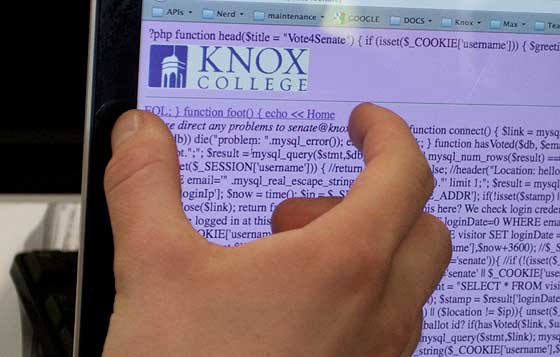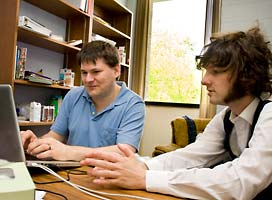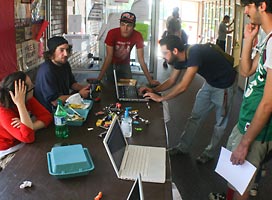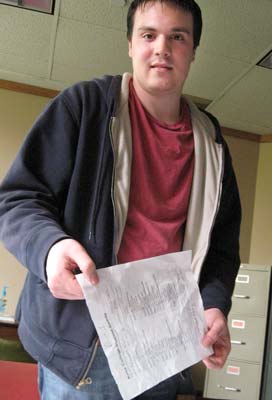

Venture Boldly

Office of Communications
2 East South Street
Galesburg, IL 61401


A new computer-based voting system, written by a Knox College student for the College's Student Senate, is credited with boosting both security and participation in campus elections.

Professor Jamie Spacco and student Maxwell Galloway-Carson review new on-line voting system.
Dubbed "Vote4Senate," the web-based system was programmed by a computer science student, Maxwell Galloway-Carson '11 of Evanston, Illinois. Galloway-Carson wrote the program as an independent study project with Jamie Spacco, assistant professor of computer science. Participation in the most recent election was 46% -- up from 36% in the previous election with paper ballots.
The project was based on specifications drawn up by another computer science student, J.C. Weinberg '13, of Gurnee, Illinois, who was serving as chair of the Student Senate's technology committee.
"When I was elected tech chair, electronic voting was one of my goals," Weinberg said. "I researched other products -- a lot were really expensive, designed for big colleges. And our data would be stored by the vendor, but we wanted something local."
Computerized Voting, Version 2.0
On-line voting had been tried previously, but abandoned after the earlier program stopped working correctly.

Knox students use the prior on-line system in a 2008 election.
Weinberg said he mentioned his desire for a new system to Spacco, who then suggested it to Galloway-Carson, a senior computer science major who had done a computer project for another office on campus.
"We knew there was a problem" with the earlier Student Senate on-line voting system, Galloway-Carson said. "There were known security risks, even though nobody had taken advantage of them. When the program failed, they used paper ballots for a year and a half."
Requirement: Meet everybody's needs
Galloway-Carson said the main problem with on-line voting is the combination of security and anonymity -- limiting it to registered voters, preserving voter anonymity and preventing the casting of multiple ballots.
"With most systems that I studied, either they weren't secure, or they were too complicated. And if it's too complicated, people can't use it correctly," Galloway-Carson said. "I tried to make it intuitive -- make sure that everyone could vote, but not more than once. Because it's anonymous, it's difficult to test that it worked correctly."

J.C. Weinberg shows an illegible paper ballot from an election in 2010.
Inaugurated this past spring, the system worked, Galloway-Carson said. "Failure was not an option. It had to work. On election day I was here the whole time, and they didn't have to call me."
"We have a solution, and we're saving paper."
Weinberg said that he and the Student Senate were pleased with the program. "The week before the election, I gave a report to Student Senate, that we had a solution, that we're saving paper. There was a round of applause for all the time and effort that Max put into it."
"I was hoping to break the 50% mark" for voter participation, Weinberg said. "We came close, 46%, definitely an improvement from last year. And we have a system that people can use in five minutes, so it doesn't take up a big part of your day. We didn't want people to have to wait in line, and then still have questions about how to vote."
Galloway-Carson graduated from Knox in June. He was awarded a post-baccalaureate fellowship to take additional courses and work on special projects for the college during the 2011-2012 academic year.
One of those projects could involve writing the user's guide, Spacco said.
"A goal is to make the program usable next year, with a whole new batch of people leading the Senate," Spacco said. "Max will have to write the documentation, so that it can work without either of us. Next year, that will be the test. Have we really succeeded in making it reusable?"
Weinberg said that he would like to see other computer science students refine the program. "I hope students continue to take an interest in the project," Weinberg said. "It's a great opportunity for the computer science department. Student Senate can be an organization that the department can use as a practice ground, to build things for their needs."
Student: "Glad that I could help make a difference"
Coincidentally, Weinberg was one of the candidates for office in the very first election with the new system, but another student won the race for vice president.
"I've definitely had an interesting perspective," Weinberg said. "It helped that I knew a lot about the technology. I'm glad that I could get the ball rolling, that I could help make a difference."
Spacco agreed that the system has been a success. "The project has been really exciting," he said. "The whole computer science department is very proud of Max's work."
Published on August 08, 2011